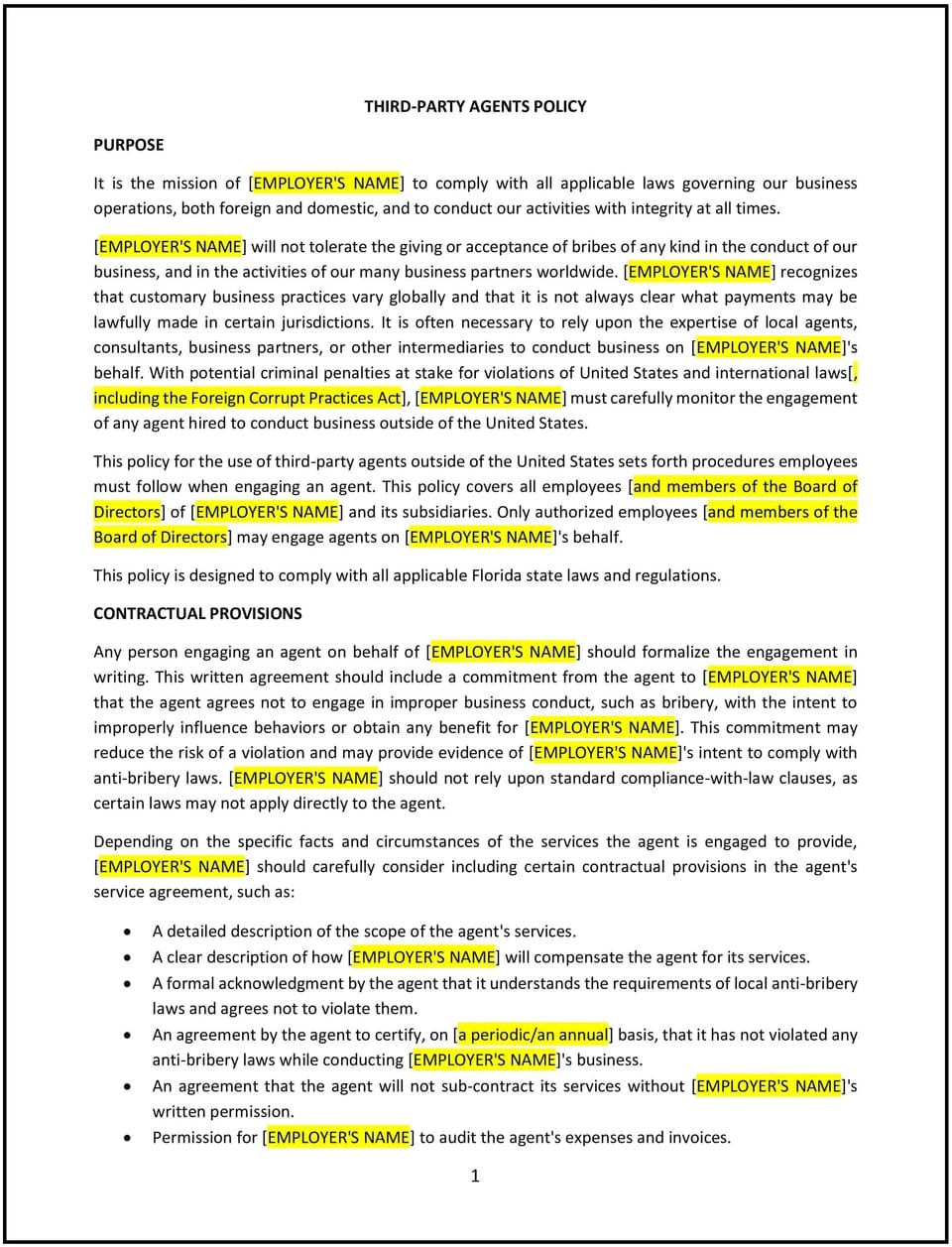Third-party agents policy (Florida): Free template

Third-party agents policy (Florida)
A third-party agents policy helps Florida businesses establish guidelines for managing relationships with external entities, such as contractors, consultants, and other service providers. This policy outlines procedures for vetting, contracting, and supervising third-party agents while ensuring transparency, accountability, and operational efficiency. It is designed to promote ethical practices, reduce risks, and provide clear expectations for managing third-party relationships.
By implementing this policy, businesses in Florida can demonstrate their commitment to ethical practices, enhance operational efficiency, and align with the state’s focus on fostering a fair and responsible workplace.
How to use this third-party agents policy (Florida)
- Define third-party agents: Clearly specify what constitutes a third-party agent, such as contractors, consultants, vendors, or service providers.
- Establish vetting procedures: Outline how businesses should vet third-party agents, including background checks, references, and compliance reviews.
- Address contract terms: Explain how businesses should negotiate and document agreements with third-party agents, including terms, conditions, and performance metrics.
- Provide supervision guidelines: Specify how businesses should supervise third-party agents to ensure they adhere to the policy and company standards.
- Communicate the policy: Share the policy with employees during onboarding and through regular communications to ensure awareness and understanding.
- Monitor adherence: Regularly review how the policy is applied and address any concerns or discrepancies promptly.
- Update the policy: Periodically assess the policy to reflect changes in workplace dynamics, legal standards, or business needs.
Benefits of using this third-party agents policy (Florida)
This policy offers several advantages for Florida businesses:
- Promotes accountability: Clear guidelines help ensure that all third-party agents are held to high standards of performance and ethics.
- Reduces risks: Defined procedures minimize the likelihood of misconduct, legal issues, or reputational damage.
- Builds trust: Demonstrates the business’s commitment to ethical practices and responsible vendor management.
- Aligns with community values: Reflects Florida’s emphasis on fairness, transparency, and mutual respect in the workplace.
- Enhances reputation: A robust policy showcases the business’s dedication to ethical practices and operational integrity.
- Improves decision-making: Helps businesses anticipate potential risks and incorporate safeguards into third-party management.
- Supports growth: A strong framework for managing third-party agents fosters a culture of accountability and continuous improvement.
Tips for using this third-party agents policy (Florida)
- Communicate clearly: Ensure employees understand the policy by providing written materials and discussing it during meetings or training sessions.
- Train employees: Educate staff on recognizing third-party agent relationships, understanding the policy, and following procedures.
- Be thorough: Conduct comprehensive vetting and supervision to ensure third-party agents meet the business’s standards and comply with the policy.
- Stay informed: Keep up with changes in vendor management trends, regulations, or best practices that may affect third-party relationships.
- Encourage feedback: Solicit input from employees to identify areas for improvement and ensure the policy meets their needs.
- Review periodically: Assess the policy’s effectiveness and make updates as needed to reflect changes in workplace dynamics or business goals.
Q: Why should Florida businesses adopt a third-party agents policy?
A: Businesses should adopt this policy to promote accountability, reduce risks, and demonstrate their commitment to ethical practices regarding third-party relationships.
Q: What types of third-party agents should businesses consider?
A: Businesses should consider contractors, consultants, vendors, service providers, and any other external entities that interact with the business.
Q: How should businesses vet third-party agents?
A: Businesses should vet third-party agents through background checks, reference checks, and compliance reviews to ensure they meet the business’s standards.
Q: Should businesses require contracts with third-party agents?
A: Businesses should require contracts that clearly outline terms, conditions, performance metrics, and expectations for third-party agents.
Q: What should businesses do if a third-party agent violates the policy?
A: Businesses should address violations promptly by investigating the issue, taking corrective actions, and reinforcing the importance of compliance.
Q: How can businesses ensure fairness in managing third-party agents?
A: Businesses should apply the policy consistently across all third-party agents, ensuring that decisions are based on objective criteria and documented evidence.
Q: How often should businesses review the policy?
A: Businesses should review the policy annually or whenever there are significant changes in workplace dynamics, legal standards, or business operations.
This article contains general legal information and does not contain legal advice. Cobrief is not a law firm or a substitute for an attorney or law firm. The law is complex and changes often. For legal advice, please ask a lawyer.


